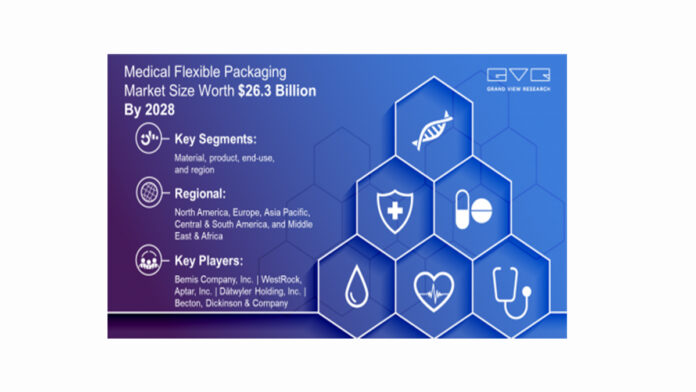The global medical flexible packaging market size is expected to reach USD 26.3 billion by 2028, according to a new report by Grand View Research, Inc., expanding at a CAGR of 6.5% from 2021 to 2028. Increasing demand for pharmaceutical products in emerging economies as well as growing demand for drug delivery systems in developed countries are driving the growth of the market. The use of flexible packaging is increasing in the healthcare industry as the companies operating in the industry are opting for sustainable functions and materials, such as paper. Paper-based packaging is included in green packaging as it is highly recyclable and economical.
The flexible packaging is well suitable for single-time use. This is especially beneficial in the packaging of single-use products, which are becoming increasingly popular to avoid the risk of cross-contamination. The products can be sterilized along with the packaging, which has reduced the chance of contamination while manufacturing the products.
The most widely used materials in the market are plastics followed by metal, paper, and bioplastics. Bioplastics are becoming increasingly popular due to government regulations regarding plastic usage & waste, as well as initiatives by several companies to adopt sustainable operations. The high tensile strength and the wide variety of products available in plastics, along with its low cost, have made it a preferable choice over its metal counterparts for packaging in the healthcare industry.
High-barrier films are largely utilized across the healthcare industry as they prevent the permeation of light, gas, flavor, aroma, oxygen, oil, water vapor, and water. These films are available in a wide variety, making them compatible with most equipment and drugs; additionally, most high-barrier film providers offer packaging made from a variety of materials to establish a one-stop solution for drug & equipment manufacturers. The high-barrier films segment is thus expected to show the highest growth rate over the forecast period.
Biologics and other such patient-oriented medicines are expected to have a positive impact on the pharmaceutical manufacturing end-use segment. The demographic trends, such as increasing cases of obesity as well as growing aging population, are expected to drive the segment further. In addition, the advancements in bioengineering and rising awareness about cosmetic implants are aiding the implant manufacturing segment.












